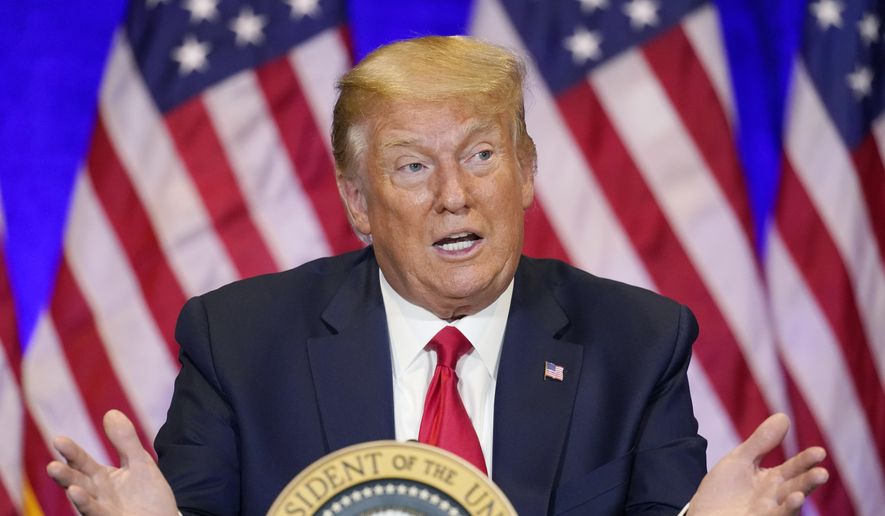A federal appeals court backed President Trump’s bid to end special protected status for migrants from what he once reportedly called “s—-hole countries,” ruling Monday that his decisions are beyond the court’s powers of review.
The 9th U.S. Circuit Court of Appeals also rejected claims that the administration was motivated by “animus” toward four countries involved in the case — El Salvador, Nicaragua, Haiti and Sudan — when it sought to end Temporary Protected Status for migrants from those nations.
Judge Consuelo M. Callahan wrote that whatever Mr. Trump’s comments, there was a “glaring lack of evidence” tying them to the official decisions made by Homeland Security to end TPS.
And even if the White House did pressure Homeland Security, that’s normal for a decision of such importance, she wrote.
“Plaintiffs fail in their burden of showing a likelihood of success, or even serious questions, on the merits of their claim that racial animus toward ’non-white, non-European’ populations was a motivating factor in the TPS terminations,” said Judge Callahan, a Bush appointee to the court.
She led the court in a 2-1 ruling overturning a lower court’s blockade.
Several other courts have blockades in place for some TPS countries, and other cases were awaiting the outcome of the 9th Circuit.
Still, the ruling was a shock to immigration activists, and, if it stands, it could turn hundreds of thousands of people into illegal immigrants unless they leave when their status expires.
“This is devastating news not just for families who are losing their protected status, but also for their communities,” said Ali Noorani, president of the National Immigration Forum.
The ruling could put pressure on Congress to come up with an immigration deal granting TPS holders a path to citizenship.
Indeed, it was discussions about such a pathway that spurred Mr. Trump’s reported comments in 2018, in a meeting with senators, disparaging the countries.
Sen. Richard Durbin, Illinois Democrat, had proposed adding TPS holders to a deal granting legal status to DACA recipients, while Mr. Trump wanted money for his border wall and limits to the chain of family migration.
Mr. Trump, in strident language, reportedly expressed his sense that the U.S. needed more people “from countries such as Norway” rather than Latin American and Africa. He specifically said Haiti couldn’t be part of any deal.
A lower court found those comments, as well as other remarks on Haitians, Nigerians and MS-13 gang members, all showed racial “animus” that tainted the administration’s decision-making.
District Judge Edward M. Chen, an Obama appointee, issued an injunction blocking the decisions.
But the appeals court on Monday, in addition to rejecting the taint argument, ruled that judges can’t peer into the administration’s decision-making, saying the law specifically says the decision belongs to the president and his team alone.
Writing in dissent, Judge Morgan Christensen, an Obama appointee, said she thought courts could review a pattern of decisions on TPS. She said it was too early to decide on the racial animus claims, though she did chide Mr. Trump for them.
“But we cannot sweep aside the words that were actually used, and it would be worse for us to deny their meaning,” she wrote. “Some of the statements expressly referred to people, not to places. The President’s statements require no deciphering.”
Temporary Protected Status is granted to migrants caught in the U.S. when natural disasters, political upheaval or other tragedies befall their home countries. It allows them to remain temporarily even if they were here illegally or their visas were due to expire, giving their home countries a chance to recover.
But in the case of El Salvador that temporary reprieve is now nearly two decades old, stemming from a 2001 earthquake. Honduras has been on the list since 1998, while Haiti’s designation came after a 2010 earthquake.
Ten countries currently have TPS designations, covering more than 400,000 people, according to the Congressional Research Service. They range from nearly 250,000 Salvadorans and nearly 80,000 Hondurans to fewer than 500 Somalis and 100 South Sudanese.
Complicating matters, many of those TPS holders have built families here over the years, including children born on U.S. soil, who have automatic citizenship.
The Catholic Legal Immigration Network said if the parents are forced to leave, it will create the “next major family separation crisis.”
“No family should be faced with the choice of either splitting up or moving their entire family, including U.S.-citizen children, to a country where they face danger,” said Anna Gallagher, the group’s executive director.
Advocates said TPS migrants, who are granted permission to work legally while under status here, are also serving in key service jobs during the coronavirus pandemic.
The Trump administration counters that the TPS program has run off the rails with extensions automatically granted by the Bush and Obama administrations, allowing people to remain well past a time when they could return to their countries.
Under Mr. Trump, Homeland Security has newly reviewed each grant. Of the 10 active ones, the administration has sought to extend four and end nine.
Six of those terminations have been put on hold by orders from various courts: El Salvador, Sudan, Honduras, Nicaragua, Haiti and Nepal.
One of the ironies of the TPS situation is that Mr. Trump’s disparaging comments drew outrage from immigrant-rights activists. Yet their arguments in court suggest that the countries are in fact in bad shape.
In one case, plaintiffs described Haiti as facing a food shortage, a housing crisis, political instability and a devastating cholera epidemic.
The Justice Department said Monday it was “pleased” with the appeals court’s decision and “its rejection of the baseless accusations of animus behind the actions.”
• Stephen Dinan can be reached at sdinan@washingtontimes.com.




Please read our comment policy before commenting.